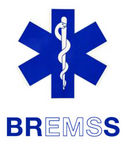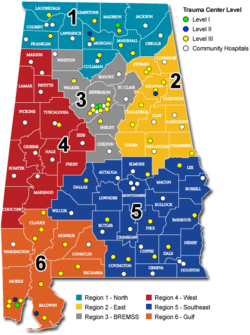Birmingham Regional EMS System: Difference between revisions
mNo edit summary |
No edit summary |
||
| (3 intermediate revisions by the same user not shown) | |||
| Line 1: | Line 1: | ||
[[Image:BREMSS logo.jpg|right|125px]] | [[Image:BREMSS logo.jpg|right|125px]] | ||
The '''Birmingham Regional Emergency Medical Services System''' ('''BREMSS''') is a multi-jurisdictional agency, established by [[UAB]], that coordinates and improves pre-hospital medical emergency response by facilitating communication with medical response agencies, 911 centers and hospitals. BREMSS processes information from 911 centers and paramedics and directs trauma, cardiac and stoke patients to the trauma center or other facility that will give them the best chance of survival. It has been designated by the Alabama Department of Public Health's Office of EMS and Trauma as the agency-in-charge for EMS/Trauma Region 3. | The '''Birmingham Regional Emergency Medical Services System''' ('''BREMSS''') is a multi-jurisdictional agency, established by [[UAB]], that coordinates and improves pre-hospital medical emergency response by facilitating communication with medical response agencies, 911 centers and hospitals. BREMSS processes information from 911 centers and paramedics and directs trauma, cardiac and stoke patients to the trauma center or other facility that will give them the best chance of survival. It has been designated by the Alabama Department of Public Health's Office of EMS and Trauma as the agency-in-charge for EMS/Trauma Region 3. The system's offices are located at 1114 [[16th Street South]], and its executive director is [[Michael Minor]]. | ||
The Regional EMS System was patterned after a similar program created by [[Joe Acker]] in Portland, Oregon. A planning group led by [[Robert Carraway]], [[Richard Treat]] and [[William Hardin]] invited Acker to Birmingham in December [[1990]] to develop and manage the system here, which was initially funded by $500,000 from UAB. BREMSS was launched on [[October 2]], [[1996]]. Its first completed call was a trauma patient picked up by the [[Homewood Fire Department]] that morning. | |||
BREMSS system includes 174 emergency medical services organizations, eighteen 911 call centers, seventeen hospitals, and over 2,800 emergency medical technicians in 80 municipalities across 6 counties. Over 1.2 million residents live within the systems service area, and, on average, the system responds to 200,000 emergencies each year. | BREMSS system includes 174 emergency medical services organizations, eighteen 911 call centers, seventeen hospitals, and over 2,800 emergency medical technicians in 80 municipalities across 6 counties. Over 1.2 million residents live within the systems service area, and, on average, the system responds to 200,000 emergencies each year. | ||
| Line 6: | Line 8: | ||
In order to coordinate so many variables, from the type of emergency, to location, to the availability of beds and specific patient-care capabilities at particular trauma centers, BREMSS utilizes proprietary LifeTrac software developed by [[Forte']], a [[Birmingham]]-based software company. | In order to coordinate so many variables, from the type of emergency, to location, to the availability of beds and specific patient-care capabilities at particular trauma centers, BREMSS utilizes proprietary LifeTrac software developed by [[Forte']], a [[Birmingham]]-based software company. | ||
[[Image:traumamap.gif|thumb|left|250px|Map of | [[Image:traumamap.gif|thumb|left|250px|Map of Alabama's EMS regions]] | ||
In the event of a major medical event such as a tornado, train crash, terrorist attach, or disease outbreak, BREMSS has the capability, through its Trauma Communication Center (TCC) to link all area hospitals over secure radio channels, allowing for rapid exchange of information. Communications services are provided to BREMSS by [[SouthernLINC Wireless]]. | In the event of a major medical event such as a tornado, train crash, terrorist attach, or disease outbreak, BREMSS has the capability, through its Trauma Communication Center (TCC) to link all area hospitals over secure radio channels, allowing for rapid exchange of information. Communications services are provided to BREMSS by [[SouthernLINC Wireless]]. | ||
| Line 12: | Line 14: | ||
Beginning in 2007, BREMSS has been contracted by the Alabama Department of Public Health to expand to a statewide service, beginning with the addition of the Huntsville region. | Beginning in 2007, BREMSS has been contracted by the Alabama Department of Public Health to expand to a statewide service, beginning with the addition of the Huntsville region. | ||
UAB physician [[Jeffrey Kirby]] reported in [[2016]] that a review of the system's data suggests that the system could be credited for a 12% reduction in trauma deaths across the region, which translates to around 5,300 lives saved over a 20-year span. | |||
BREMSS moved in [[2021]] from 1601 [[11th Avenue South]] to its present facility to make way for construction of a new [[UAB Child Development Center]]. | |||
==Executive directors== | |||
* [[Joe Acker]], 1990–2018 | |||
* [[Michael Minor]], 2018– | |||
==References== | ==References== | ||
* Cunningham, Russell (September 2006) "First Response: Our Emergency Medical Services System is one of the best." ''Birmingham'' | * Cunningham, Russell (September 2006) "First Response: Our Emergency Medical Services System is one of the best." ''Birmingham'' magazine. Vol. 46, No. 9, p. 322 | ||
* "Alabama to Route Specialty Care Patients." (October 2006) ''EMS Insider''. Vol. 24, Issue 10, | * "Alabama to Route Specialty Care Patients." (October 2006) ''EMS Insider''. Vol. 24, Issue 10 | ||
* Shephard, Bob (October 12, 2016) "[https://www.uab.edu/news/campus/item/7689-bremss-trauma-system-celebrates-20th-anniversary BREMSS trauma system celebrates 20th anniversary]" ''UAB News'' | |||
==External link== | ==External link== | ||
| Line 22: | Line 33: | ||
[[Category:Health care industry]] | [[Category:Health care industry]] | ||
[[Category:Multijurisdictional agencies]] | [[Category:Multijurisdictional agencies]] | ||
[[Category:UAB]] | |||
[[Category:16th Street South]] | |||
[[Category:1996 establishments]] | |||
Latest revision as of 14:34, 20 May 2023
The Birmingham Regional Emergency Medical Services System (BREMSS) is a multi-jurisdictional agency, established by UAB, that coordinates and improves pre-hospital medical emergency response by facilitating communication with medical response agencies, 911 centers and hospitals. BREMSS processes information from 911 centers and paramedics and directs trauma, cardiac and stoke patients to the trauma center or other facility that will give them the best chance of survival. It has been designated by the Alabama Department of Public Health's Office of EMS and Trauma as the agency-in-charge for EMS/Trauma Region 3. The system's offices are located at 1114 16th Street South, and its executive director is Michael Minor.
The Regional EMS System was patterned after a similar program created by Joe Acker in Portland, Oregon. A planning group led by Robert Carraway, Richard Treat and William Hardin invited Acker to Birmingham in December 1990 to develop and manage the system here, which was initially funded by $500,000 from UAB. BREMSS was launched on October 2, 1996. Its first completed call was a trauma patient picked up by the Homewood Fire Department that morning.
BREMSS system includes 174 emergency medical services organizations, eighteen 911 call centers, seventeen hospitals, and over 2,800 emergency medical technicians in 80 municipalities across 6 counties. Over 1.2 million residents live within the systems service area, and, on average, the system responds to 200,000 emergencies each year.
In order to coordinate so many variables, from the type of emergency, to location, to the availability of beds and specific patient-care capabilities at particular trauma centers, BREMSS utilizes proprietary LifeTrac software developed by Forte', a Birmingham-based software company.
In the event of a major medical event such as a tornado, train crash, terrorist attach, or disease outbreak, BREMSS has the capability, through its Trauma Communication Center (TCC) to link all area hospitals over secure radio channels, allowing for rapid exchange of information. Communications services are provided to BREMSS by SouthernLINC Wireless.
In July 2006, BREMSS was given the Homeland Security Award from Mitretek Systems and the John F. Kennedy School of Government at Harvard University.
Beginning in 2007, BREMSS has been contracted by the Alabama Department of Public Health to expand to a statewide service, beginning with the addition of the Huntsville region.
UAB physician Jeffrey Kirby reported in 2016 that a review of the system's data suggests that the system could be credited for a 12% reduction in trauma deaths across the region, which translates to around 5,300 lives saved over a 20-year span.
BREMSS moved in 2021 from 1601 11th Avenue South to its present facility to make way for construction of a new UAB Child Development Center.
Executive directors
- Joe Acker, 1990–2018
- Michael Minor, 2018–
References
- Cunningham, Russell (September 2006) "First Response: Our Emergency Medical Services System is one of the best." Birmingham magazine. Vol. 46, No. 9, p. 322
- "Alabama to Route Specialty Care Patients." (October 2006) EMS Insider. Vol. 24, Issue 10
- Shephard, Bob (October 12, 2016) "BREMSS trauma system celebrates 20th anniversary" UAB News
External link
- BREMSS website

